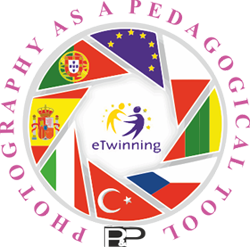 Il ppt, scaricabile cliccando sull'immagine, è stato presentato a Roma, l'8 Maggio 2014, presso Spazio Europa nel corso del seminario 'Le opportunità europee per il futuro dei giovani a partire dalla scuola'.
Il ppt, scaricabile cliccando sull'immagine, è stato presentato a Roma, l'8 Maggio 2014, presso Spazio Europa nel corso del seminario 'Le opportunità europee per il futuro dei giovani a partire dalla scuola'.
 Tra gli interventi dedicati a: "Buone Pratiche nelle scuole" è stato presentato il Progetto P&P che ha vinto il 1° premio europeo eTwinning nella categoria 16-19 anni.
Tra gli interventi dedicati a: "Buone Pratiche nelle scuole" è stato presentato il Progetto P&P che ha vinto il 1° premio europeo eTwinning nella categoria 16-19 anni. Description of the project
Description of the project
This project took an action-oriented approach to learning. Students were required to take their cameras and go out and observe the world around them in order to look for connections between the learning contents addressed in different school subjects like Mathematics, Biology, Geology, Chemistry, History, Foreign Languages, Mother Tongue, Arts, ICT, Music, Physical Education and vocational studies (Marketing, Economics, Restaurant Service) and the reality around them. The camera and the photograph was turned into a support of the learning process. Students expressed concepts and ideas studied in their classes into photos.
The results of the different activities were disseminated through exhibitions held in each partner schools during the exchanges (Feelings, Gestures: Guess What, Photomaths, Learning Folk from the Past, European Writers, Proverbs and Idioms among others), the production of a pocket calendar, a school year calendar, a pencil case, banners, a T-shirt, a puzzle, a quilt and the project’s booklet. For each exchange, schools brought samples of their local foods. Slideshows and videos were created to present the activities developed during the exchanges. The results were published and shared on the projects’ eTwinning platform. In addition, sports tournaments (basketball, korfball, softball, handball, football) were organised in each participating country during the students' mobilities.
The results of the different activities were published and disseminated on the eTwinning platform created for the P&P Comenius project on the project promoted intercultural interaction, increasing the awareness of other European cultural and linguistic features. The contact with a multiplicity of diverse cultures was a source of cultural enrichment fostering the development of a spirit of openness towards different cultures for a genuine understanding and sharing of European diversity by establishing an empathic relationship among teachers and students from different European countries. This contact with the experience of mobility promoted social cohesion and intercultural dialogue.
As the project was based on teamwork, collaboration, communication in the mother tongue and foreign languages, the use of ICT, all participants' participation in the planning and evaluation of the  project, the improvement of learning outcomes in Mathematics, the experience in living in the host country during the exchanges, the promotion of students’ autonomy and the adoption of new learning methods addressed the eight lifelong learning key competences defined by the European Reference Framework
project, the improvement of learning outcomes in Mathematics, the experience in living in the host country during the exchanges, the promotion of students’ autonomy and the adoption of new learning methods addressed the eight lifelong learning key competences defined by the European Reference Framework
Objectives of the partnership
- To collaboratively design and implement a set of innovative activities for different curricular areas/ contents that will imply the use of ICT and media like the camera and the photography;
- To improve students' academic results by fostering their observation, expression skills and creativity through photography;
- To improve communication skills in foreign languages with a view to taking up opportunities to participate in a transnational project and to learn with and from students from other countries of Europe through the use of ICT tools by creating opportunities for authentic communicative events like emails exchange, chat sessions, opening debates and discussion forums;
- To increase language awareness and stimulate curiosity towards the languages and the cultures of the partner countries through students' interaction and participation in common activities, in the production of joint products and through partners encounter during the exchanges visits and during the work process;
- To raise confidence and positive self-esteem by attending different learning styles and by valuing other forms of knowledge;
- To support the development of the key competences for lifelong learning as defined in the European Reference Framework;
- To strengthen the European Dimension of Education by acquiring knowledge on other countries schools systems and their cultures and making students understand the need for interdependence among nations;
- To enrich teachers and students with pedagogical experiences to achieve greater motivation in the teaching and learning process during the students and the teachers mobilities and during the whole process of interaction via email or chat sessions;
- To develop students' autonomy and social skills and the four dimensions of the Intercultural Communicative Competence (Byram, 1997) 'savoir apprendre', 'savoir être', 'savoir faire' and 'savoir s'engager'.

Warning: Creating default object from empty value in /home/qc7exb1q/public_html/oldsite/templates/italiapa/html/com_content/category/default_articles.php on line 22



